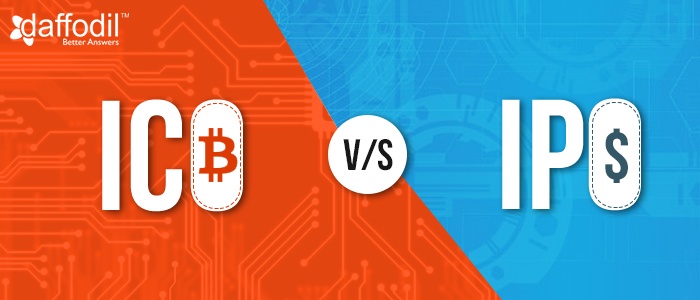
No matter how great a business idea is, its existence and endurance is difficult without sufficient funds. Since long, Initial Public Offering (IPO) has been one of the popular and regulated fundraising schemes, which, today is challenged by Initial Coin Offering (ICO). Thanks to the steeping rise in popularity of cryptocurrencies and Blockchain.
IPO and ICO, both share a similar goal for a company and that’s initial fundraising. While the idea is same, there is a difference in modes used to secure funds. While Initial Coin Offering (ICO) uses tokens (cryptocurrency) to raise capital, Initial Public Offering (IPO) puts in company’s stock for sale. In addition to this, there are a few regulatory, time to market, ownership differences between the two that are shared in the segment below.
1. Crowdfunding Regulations: IPO vs. ICO
Startups, financial institutions, or any organization, which is up to issuing an IPO needs to create a legal document, called prospectus. This document highlights the reason behind brining the company stocks to public, and should maintain a transparency between the investors and the organization. Some of the must haves of the prospectus include company information, IPO details (which gives investors a clear picture of the aim) and generate interest to invest in the IPO.
In the other hand, ICOs do not have such legal requirement. However, to launch an ICO, a document in the form of a white paper has to be created that shares the project details. However, an ICO, unlike an IPO do not follow any standard and the white paper is shared with the sole aim of informing prospect investors about the project, tokens, and the how they can redeem value of those tokens.
2. Defining Company’s Credibility: ICO vs IPO
To launch an IPO, a company needs to satisfy a set of requirements. This includes a good market reputation, an earning threshold, verification of accounts, minimum market capitalization, trading permission (on multiple platforms) etc. All of these processes define credibility of a company to issue an IPO and is quite rigid and complex.
ICOs are issued on Blockchain and therefore, there are no regulatory standards or legal protocols as such to launch an ICO (except for a White paper that defines the project). However, with this, it is quite difficult to incite investors and therefore, many companies do have a functional prototype for their projects that gives a clear idea to the investors about the project. Therefore, the way to define credibility of the project is through reputed names who back the project or by analyzing the potential of the business idea.
3 Ownership and Utility: ICO vs IPO
Buying a company’s stocks means you are securing an ownership in projected earnings of the company (which is likely to rise). Depending upon the type of stocks (common stocks, preferred stocks), investors can realize their profit at the time of buying stocks. For example: For Preferred stocks, investors are usually assigned with fixed dividends, which results in less risk.
ICOs, unlike IPOs do not grant an ownership in the project. Rather, a token (which is generally a crypto currency) is given to the investors, which can be used for digital transactions. The value of cryptocurrency is realized with its perceived utility. Other factors that contribute to the value of cryptocurrency is limited supply or supply/demand, energy used to secure Blockchain, market dilution, legal/government issues, public perception, Blockchain difficulty level etc. The value of cryptocurrencies is quite volatile and so does can be your profit. That is why, buying and selling of these currencies through Blockchain wallets happens frequently. Or, realizing the potential of the currency, investors usually store these currencies in their wallets for a longer period.
4. Time for Market Launch: ICO vs IPO
The process of issuing an IPO is quite lengthy, considering the rigid process that it undergoes to follow the regulations. The process of approval from regulated authorities take time, around 4-6 months.
While the process and time to launch an ICO is quite shorter than IPO, but it can take a long time for companies to create hype around the tokens and project. However, once a white paper is done and tokens are developed, the ICOs are ready to be issued to the investors.
ICO or IPO: The Most Profitable Fundraising Scheme
ICOs are a great option for fundraising when companies are not interested to share their equity with the investors (which is its USB as well). Also, the time to market is shorter and returns are profitable (with a good project credibility). However, no regulation is the only (and one of the major) concern with ICOS today.
IPOs indeed are secure than ICOs. However, they should be an option for project on large scale only. Launching an IPO in itself is a complex process and inviting investors to buy a company’s stock (in large share) requires a game plan.
Between the two, launching an ICO seems to be a better option (and it’s trending as well). Nevertheless, considering ICOs for fundraising, just because it enables to escape strict regulations is misunderstanding of the concept. Pre-define your requirements (project scale, time, funds to be raised etc.) before your decide upon any of the fundraising schemes.
Need help to launch an ICO for your business? Talk to our Blockchain technology expert via 30 minute free consultation.



